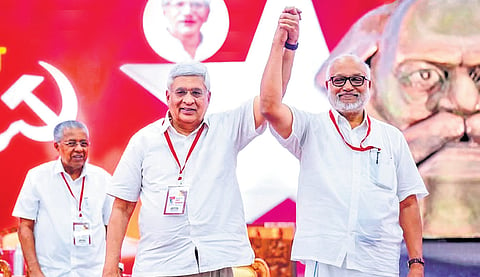

Sunday April 6, 2025 marked the end of a long political innings in the history of the Communist Party of India (Marxist). Veteran leader Prakash Karat stepped down from the CPM Politburo after a long 33-year stint, most of which marked a tumultuous era in the political history of the country.
A three-time general secretary of the country's largest Communist party, the 77-year-old Karat has literally seen history being made at close quarters -- brushing past it, at times playing a role in its making, oft walking along the sidelines without being noticed and sometimes even drawing contempt for the role that he willingly chose. He's often accused of presiding over the downfall of the Left in the country.
Knowingly or unknowingly, Karat has undoubtedly played one of the most crucial roles since the CPM's formation in 1964.
His first major act was in 1996 when he, along with veterans E Balanandan, EK Nayanar, VS Achuthanandan and contemporaries Sitaram Yechury, S Ramachandran Pillai and Sunil Maitra, stringently opposed the Prime Ministerial post offered to Communist patriarch Jyoti Basu on a platter, something Basu - years later - chose to term as a "historic blunder."
Many still believe that had Basu taken up the job, it would have altered the course of history, not just for the Left, but for the nation too. Karat, however, still chooses to believe that Basu not being allowed to take it up wasn't the reason for the party's drastic decline in subsequent years. He made this position clear, even in a recent interview.
It was in 2005 that Karat took over as the CPM's fourth general secretary, a year after the party chose to support the Congress-led first UPA government. The party, which had 43 MPs in the Lok Sabha, commanded wide respect in political circles and was able to wield major influence on the Union government. This resulted in a slew of exemplary legislations like the Right To Information Act, MGNREGA scheme et al.
The love-hate relation between the CPM and the Indian National Congress did not last long, as the Karat-led Left withdrew its support to the UPA government in 2008 over the Indo-US nuclear deal. The decision, which was seen as an ideologically upright move, turned costly not just for the Left, but for the entire anti-BJP political spectrum in the country.
The CPM later had to pay a heavy price as its electoral tally in Lok Sabha quickly declined to 16 in 2009, nine in 2014 and three in 2019. The CPM managed to win just four seats in the last Lok Sabha polls. It was during Karat's tenure that the party lost West Bengal that had been a Left citadel for 34 long years.
A slew of decisions reportedly piloted by Karat both as party secretary and even post-tenure - including not fielding VS Achuthanandan for the Kerala assembly in 2006, or blocking then general secretary Sitaram Yechury's entry into the Rajya Sabha - have had an impact on Left's fortunes.
Why he chose to tread a hard line, both politically and ideologically, has long remained an enigma, given its impracticality in the fast-shifting political equations of present times. Karat indeed remains a Communist theoretician who has actually chosen to practise what he has long preached –- a rare quality, but not necessarily the right one.
P.S: The end of a unique experiment
In a way, Karat's Politburo exit also marks the culmination of a unique, yet successful political experiment that the CPM implemented in its attempt to nurture a new crop of young leaders. It was the 13th Party Congress held in Thiruvananthapuram from December 27, 1988, to January 1, 1989 that brought in a crucial amendment to the party constitution to introduce the Central Secretariat, as an intermediary forum between CC and PB.
The first-ever five-member central secretariat comprised Prakash Karat (Delhi), S Ramachandran Pillai (Kerala), Sitaram Yechury (Andhra Pradesh), P Ramachandran (Kerala-born Tamil Nadu leader) and Sunil Maitra (West Bengal). Unlike now, secretariat members could then attend Politburo meetings. All of them were elected to the Politburo (PB) at the next Party Congress held in Chennai (then Madras) in 1992.
"The central secretariat members used to attend PB meetings. Induction into the secretariat was more of a training for the same. After our tenure, the practice of letting them attend PB meetings was discontinued. Though the central secretariat continued to function even after that, it was mostly entrusted with only regular work," recalled S Ramachandran Pillai.
Known as SRP in party circles, Pillai exited the PB at the Kannur Congress in 2022, after being part of it for 30 long years. Yechury, who went on to become the party general secretary at the 21st Congress at Visakhapatanam in 2015, served three terms in the top post, until his passing away last September. SRP was incidentally the prime opponent of Yechury for the top post, when the latter was first elected.